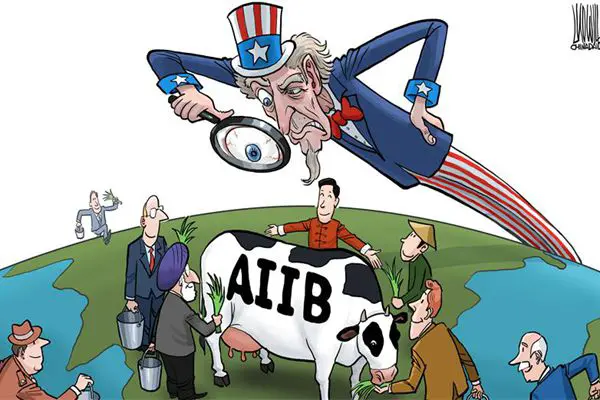Experts this week welcomed Cambodia's membership to the nascent China-led Asian Infrastructure Investment Bank (AIIB), saying it would provide much-needed diversity of funding for the nation's infrastructure and connectivity needs, a local newspaper reported Wednesday.
Launched in Beijing last weekend, the multilateral development bank aims to support infrastructure growth in the Asia-Pacific region through the provision of loans, and supports the China-proposed "One Belt, One Road" initiative to boost trade and connectivity across the Eurasian landmass.
Last week, Cambodia's National Assembly ratified a 62. 3-million-U.S.-dollar investment proposal in the 100-billion-U.S.- dollar capitalized bank, making Cambodia one of 57 prospective founding member states throughout the world.
"The more institutions that Cambodia can tap into for funding the better," David Van, managing director at consultancy firm Bower Group Asia, was quoted by the Cambodia Daily as saying.
"It wouldn't be surprising if the AIIB becomes the largest donor (to Cambodia) considering the funds available...(and because) they are keen to develop the Greater Mekong Sub-region," he said.
The bank is expected to approve its first loan within six months, and thereafter to lend between 10 billion U.S. dollars to 15 billion U.S. dollars per year to members for at least five years, according to its newly elected president Jin Liqun.
Its launch comes within a decade in which the Asian Development Bank (ADB)-- dominated by Japan--estimates that developing countries in Asia will require nearly 8 trillion U.S. dollars worth of infrastructure investments to sustain development.
Phay Siphan, Cambodia's Council of Ministers spokesman, has strong hopes that the AIIB will not only help to fund the country' s road and rail needs, but also support its ambitions to enhance the country's regional connectivity.
"Infrastructure is a key policy for the government, both domestically and regionally," he was quoted by the newspaper as saying.
"We want to connect rural areas in provinces to cities, boost connections between markets and consumers, and connect better to regional markets like Thailand and Laos," he said.
For Hal Hill, a professor of Southeast Asian economies at Australian National University, the AIIB is essentially a vehicle to bring much-needed new funding sources and expertise to Cambodia and Asia as a whole.
 简体中文
简体中文

